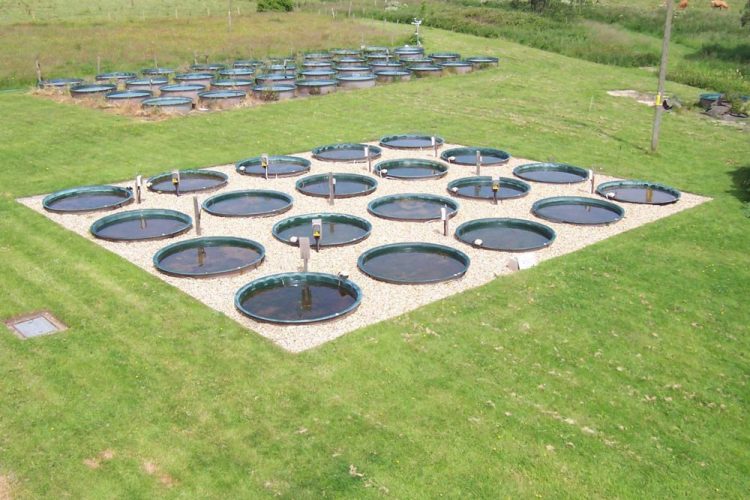Warming ponds could accelerate climate change

Ponds used in the experiment are shown. Credit: University of Exeter
The scientists experimentally warmed an array of ponds over seven years by 4-5ºC and studied the impacts on greenhouse gas emissions and rates of metabolism.
Changes observed after the first year became “amplified” over a longer period, according to the study by the University of Exeter and Queen Mary University of London
After seven years, a pond's ability to absorb carbon dioxide (CO2) was reduced by almost half, while methane release almost doubled.
Lakes and ponds cover about 4% of Earth's surface (excluding areas covered by glaciers and ice sheets) but they are disproportionately large sources of methane and CO2 to the atmosphere.
Ponds of less than one square metre are responsible for releasing about 40% of all methane emissions from inland waters.
“This is the first experiment to investigate the long-term effects of warming in aquatic ecosystems,” said lead author Professor Gabriel Yvon-Durocher, of the Environment and Sustainability Institute on the University of Exeter's Penryn Campus in Cornwall.
“Given the substantial contribution small ponds make to the emission of greenhouse gases, it is vital to understand how they might respond to global warming.
“Our findings show that warming can fundamentally alter the carbon balance of small ponds over a number of years, reducing their capacity to absorb carbon dioxide and increasing emissions of methane.
“This could ultimately accelerate climate change.”
Such effects are known as “positive feedbacks” – where the effects of global warming on components of the biosphere lead to changes that further climate change.
“The amplified effects of experimental warming we have observed in ponds are different to those we typically see on land, where large initial effects of warming appear to diminish over the long term,” Professor Yvon-Durocher said.
“This accelerating effect in ponds, which could have serious impacts on climate change, is not currently accounted for in Intergovernmental Panel on Climate Change models.”
The paper, entitled “Long-term warming amplifies shifts in the carbon cycle of experimental ponds”, is published in the journal Nature Climate Change.
The study, supported by a grant from the Natural Environment Research Council, started in 2007 and continues to gather data.
Media Contact
All latest news from the category: Life Sciences and Chemistry
Articles and reports from the Life Sciences and chemistry area deal with applied and basic research into modern biology, chemistry and human medicine.
Valuable information can be found on a range of life sciences fields including bacteriology, biochemistry, bionics, bioinformatics, biophysics, biotechnology, genetics, geobotany, human biology, marine biology, microbiology, molecular biology, cellular biology, zoology, bioinorganic chemistry, microchemistry and environmental chemistry.
Newest articles

Making diamonds at ambient pressure
Scientists develop novel liquid metal alloy system to synthesize diamond under moderate conditions. Did you know that 99% of synthetic diamonds are currently produced using high-pressure and high-temperature (HPHT) methods?[2]…

Eruption of mega-magnetic star lights up nearby galaxy
Thanks to ESA satellites, an international team including UNIGE researchers has detected a giant eruption coming from a magnetar, an extremely magnetic neutron star. While ESA’s satellite INTEGRAL was observing…

Solving the riddle of the sphingolipids in coronary artery disease
Weill Cornell Medicine investigators have uncovered a way to unleash in blood vessels the protective effects of a type of fat-related molecule known as a sphingolipid, suggesting a promising new…





















